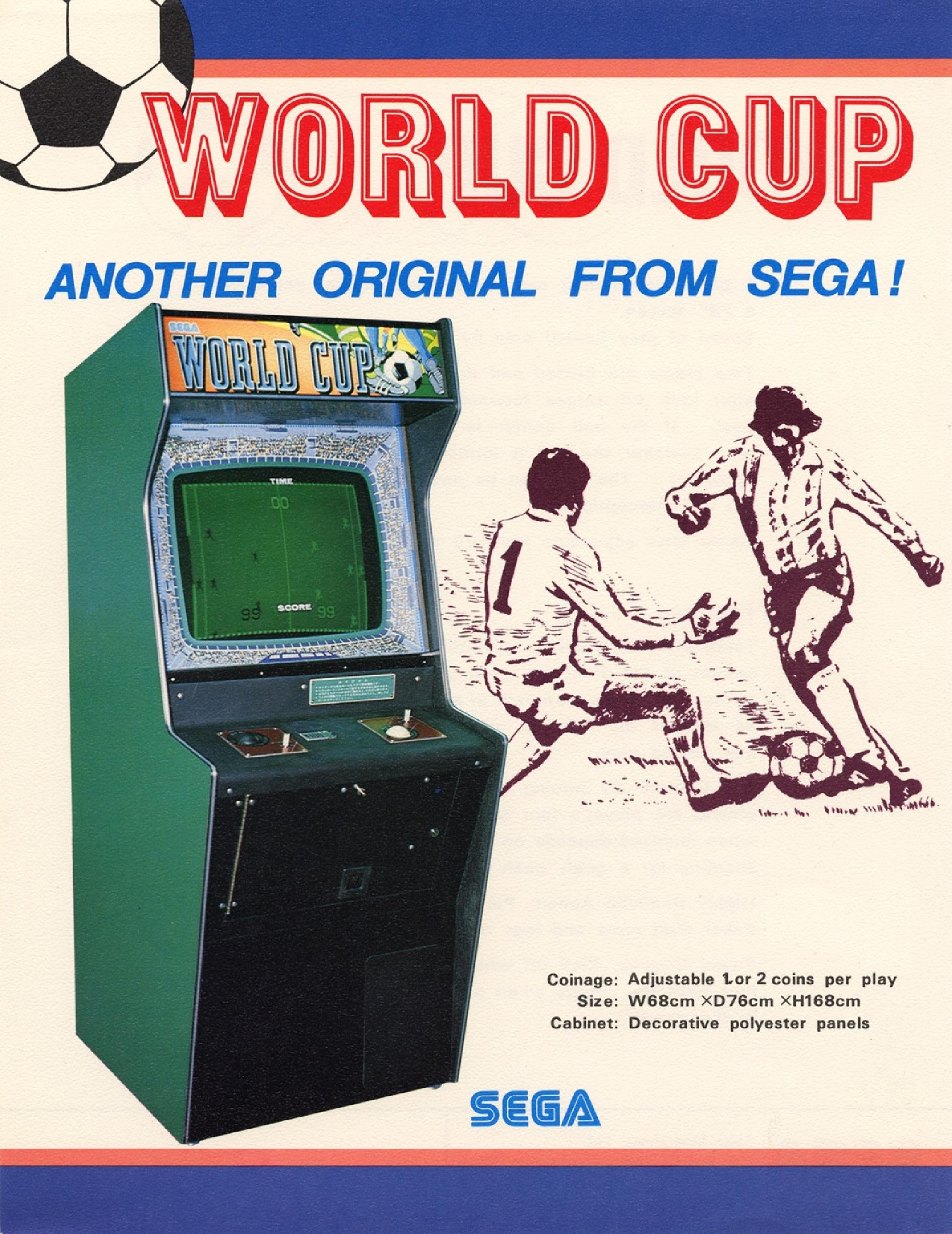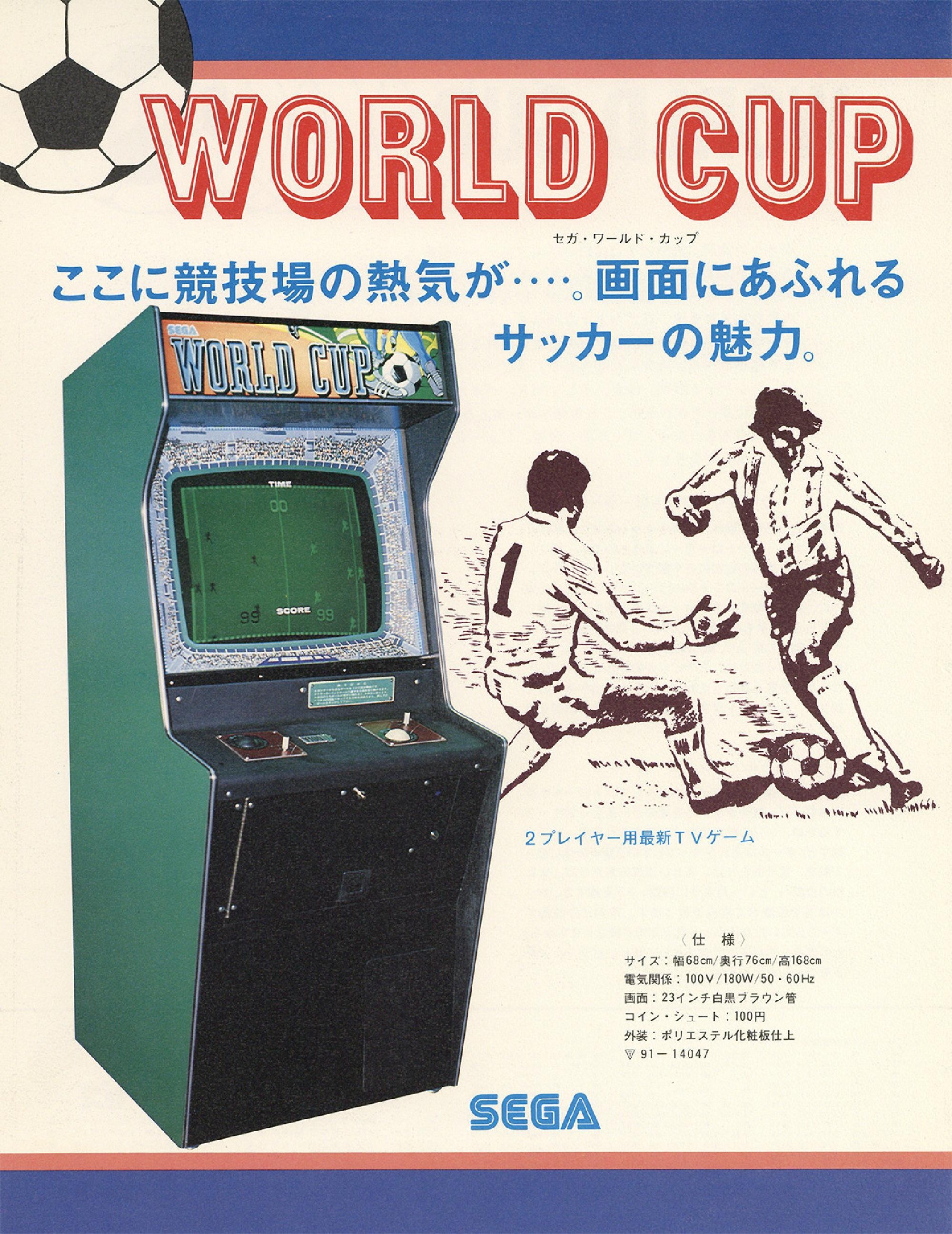Difference between revisions of "World Cup"
From Sega Retro
m |
Hyperspeed34 (talk | contribs) |
||
| (2 intermediate revisions by one other user not shown) | |||
| Line 2: | Line 2: | ||
| logo=WorldCup logo.png | | logo=WorldCup logo.png | ||
| bobscreen= | | bobscreen= | ||
| − | | publisher=[[Sega]] | + | | publisher=[[Sega Enterprises, Ltd.]] |
| − | | developer=[[Sega]] | + | | developer=[[Sega Enterprises, Ltd.]] |
| system=Discrete logic arcade | | system=Discrete logic arcade | ||
| sounddriver= | | sounddriver= | ||
| Line 14: | Line 14: | ||
}} | }} | ||
}} | }} | ||
| − | {{sub-stub}}'''''{{PAGENAME}}''''' (ワールドカップ) is a 1977 discrete logic soccer game manufactured by [[Sega]] | + | {{sub-stub}}'''''{{PAGENAME}}''''' (ワールドカップ) is a 1977 discrete logic soccer game manufactured by [[Sega Enterprises, Ltd.]] Two players use a trackball to move soccer players across the field and pass the ball or shooting a goal by pushing the trackball. If an opponent moves their player on top of the other player, the ball is stolen. The player with the higher score at the end of the game (which lasts from 60 to 90 seconds) is the winner. ''World Cup'' has kick off whistle, applause and cheering sound effects. |
| − | It was the first game to use a trackball controller. It inspired | + | It was the first game to use a trackball controller, and was a pioneering title that laid the foundations for later [[wikipedia:Sports video games|sports video games]] that followed. The unique control system and game mechanics made the gameplay faster and more varied than earlier sports games. It notably inspired [[Atari]]'s ''[https://en.wikipedia.org/wiki/Football_(1978_video_game) Football]'' (1978), which adapted the use of a trackball controller and built upon its gameplay foundation. In turn, that game was followed by ''Atari Baseball'', ''Atari Soccer'' and ''Atari Basketball'' in 1979.{{ref|1=[https://journals.humankinetics.com/view/journals/shr/54/2/article-p200.xml The Birth and Development of Sports Video Games From the 1950s to the Early 1980s]}} |
| + | |||
| + | ==Gameplay== | ||
| + | Two players control two six-player teams. They each use a trackball to control the players, while a knob shifts the ball around a player's foot for passing and shooting. If the player with the ball is touched by an opponent, they lose possession.{{ref|1=[https://journals.humankinetics.com/view/journals/shr/54/2/article-p200.xml The Birth and Development of Sports Video Games From the 1950s to the Early 1980s]}} | ||
==Specifications== | ==Specifications== | ||
Latest revision as of 02:12, 8 November 2024

| |||||||||||||

| |||||||||||||
| World Cup | |||||||||||||
|---|---|---|---|---|---|---|---|---|---|---|---|---|---|
| System(s): Discrete logic arcade | |||||||||||||
| Publisher: Sega Enterprises, Ltd. | |||||||||||||
| Developer: Sega Enterprises, Ltd. | |||||||||||||
| Genre: Sports | |||||||||||||
| Number of players: 1-2 | |||||||||||||
|
This teeny-tiny article needs some work. You can help us by expanding it.
World Cup (ワールドカップ) is a 1977 discrete logic soccer game manufactured by Sega Enterprises, Ltd. Two players use a trackball to move soccer players across the field and pass the ball or shooting a goal by pushing the trackball. If an opponent moves their player on top of the other player, the ball is stolen. The player with the higher score at the end of the game (which lasts from 60 to 90 seconds) is the winner. World Cup has kick off whistle, applause and cheering sound effects.
It was the first game to use a trackball controller, and was a pioneering title that laid the foundations for later sports video games that followed. The unique control system and game mechanics made the gameplay faster and more varied than earlier sports games. It notably inspired Atari's Football (1978), which adapted the use of a trackball controller and built upon its gameplay foundation. In turn, that game was followed by Atari Baseball, Atari Soccer and Atari Basketball in 1979.[3]
Contents
Gameplay
Two players control two six-player teams. They each use a trackball to control the players, while a knob shifts the ball around a player's foot for passing and shooting. If the player with the ball is touched by an opponent, they lose possession.[3]
Specifications
Dimensions
- Mass: 92kg
Promotional material
Physical scans
| Discrete logic, JP | ||||
|---|---|---|---|---|




